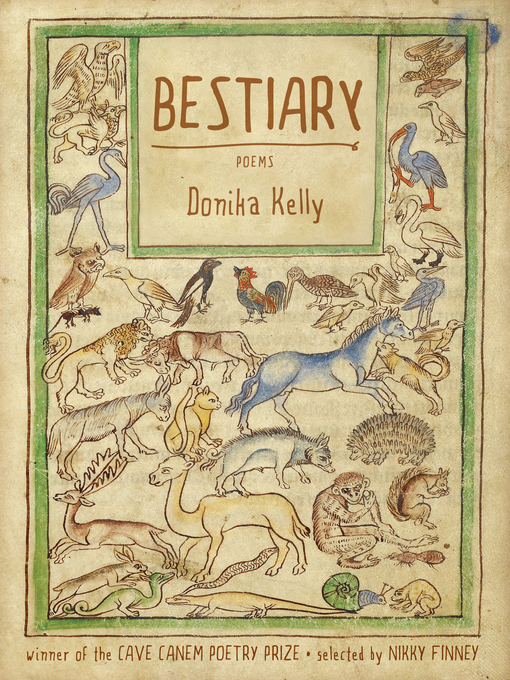Donika Kelly's fierce debut collection, longlisted for the 2016 National Book Award and winner of the 2015 Cave Canem Poetry Prize
I thought myself lion and serpent. Thought
myself body enough for two, for we.
Found comfort in never being lonely.
What burst from my back, from my bones, what lived
along the ridge from crown to crown, from mane
to forked tongue beneath the skin. What clamor
we made in the birthing. What hiss and rumble
at the splitting, at the horns and beard,
at the glottal bleat. What bridges our back.
What strong neck, what bright eye. What menagerie
are we. What we've made of ourselves.
—from "Love Poem: Chimera"
Across this remarkable first book are encounters with animals, legendary beasts, and mythological monsters—half human and half something else. Donika Kelly's Bestiary is a catalogue of creatures—from the whale and ostrich to the pegasus and chimera to the centaur and griffin. Among them too are poems of love, self-discovery, and travel, from "Out West" to "Back East." Lurking in the middle of this powerful and multifaceted collection is a wrenching sequence that wonders just who or what is the real monster inside this life of survival and reflection. Selected and with an introduction by the National Book Award winner Nikky Finney, Bestiary questions what makes us human, what makes us whole.
-
Creators
-
Publisher
-
Release date
October 11, 2016 -
Formats
-
Kindle Book
-
OverDrive Read
- ISBN: 9781555979539
- File size: 2193 KB
-
EPUB ebook
- ISBN: 9781555979539
- File size: 2193 KB
-
-
Languages
- English
-
Reviews
-
Publisher's Weekly
October 3, 2016
In her astounding debut, Kelly, winner of the 2015 Cave Canem Prize, catalogs creatures familiar and mythical as she turns monsters into recognizable portraits of humankind
.
The poems employ language that sinks its teeth in at vulnerable moments, easily piercing the tenderest spots: “Freedom is a thread of light snaking/ the canyon like an ant through a conch.” Despite the collection’s eponymous grounding theme, Kelly doesn’t strictly use mythology to teach a moral lesson. She sets the tone with “Catalogue,” outlining with care the anxiety and excitement of growing up: “You grow. You are large./ You are a 19th century
poem./ All of America is inside you.” Poems such as “Fourth Grade Autobiography” explore childhood memories with precision and clarity. Kelly’s speaker recalls flashes of neighborhood parties at a time when youthful innocence starts to crack. “My favorite things are cartwheels, salted plums,/ and playing catch with my dad,” she writes. “I am afraid/ of riots and falling and the dark.” The compact scenes of the poem “How to Be Alone” burn like a hot knife to
an open wound; the speaker’s loneliness becomes armor in the wake of her mother’s death and father’s violent transgressions. Kelly’s creatures howl and whimper as she imparts emotional truths: “Love,/ I pound the Earth for you. I pound the Earth.” -
Library Journal
Starred review from November 1, 2016
When a poem works--when it slows your breath or shakes you with the force of its special logic--it has given something far greater than the sum of its parts. Kelly achieves this essential quality again and again in this striking debut collection, which was short-listed for the 2016 National Book Award. Within are the creatures, those too real and those imagined, that prowl her world. Along with the prayers she invokes to keep them at bay, there's the tenderness she somehow finds to draw them from the shadows: "At the threshold, your hand heavies, widens/ into a fist. A knock. The door's yellow/ eye mocks you, and you wish your back would split./ You wish the coat would burst from your skin. You have no patience. You are full of want/ and marrow. The moon is new and this/ desire to be your heaviest self." VERDICT In tautly rendered lines, Kelly creates a world that is deeply felt and darkly complex. A strong choice for most collections.--Iris S. Rosenberg, New York
Copyright 2016 School Library Journal, LLC Used with permission.
-
Booklist
November 1, 2016
While confronting a harrowing memory in Little Box, Kelly writes, You'd rather be a simpler animal. / You try to imagine what the bear feels. And in her prize-winning first collection, recently longlisted for the National Book Award, Kelly does conjure a roaring menagerie of creatures. Yet, unlike its medieval namesake (a moralizing catalog of breathtaking beasts), this Bestiary swelling with swallows, centaurs, and satyrs proffers only truth. The sprawling How to be alone, for example, a series of page-centered single stanzas, recounts the horrors of attempted suicide and sexual abuse within the context of a woman and the dogs who keep her warm, guarding the little lock of her peace. In Archaeology, a poem ruptured by white space, the poet grapples with a disquieting resemblance to her father, declaring, I am dragging his face / out of my own. This uneasy duality and relentless pluck pulse through each page. As Kelly writes to the ever-fluctuating block of ice, Be a thing that breaks / before it bends. Unflinching, fierce, and true, this collection is just that.(Reprinted with permission of Booklist, copyright 2016, American Library Association.) -
Library Journal
-
Loading
Why is availability limited?
×Availability can change throughout the month based on the library's budget. You can still place a hold on the title, and your hold will be automatically filled as soon as the title is available again.
The Kindle Book format for this title is not supported on:
×Read-along ebook
×The OverDrive Read format of this ebook has professional narration that plays while you read in your browser. Learn more here.



